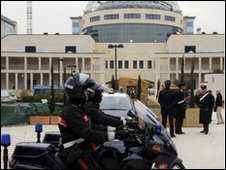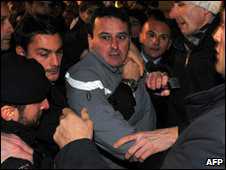Category: EU Members
European Council decided to open accession negotiations with Turkey on 17 Dec. 2004
-

Russo-Turkish Rapprochement through the Idea of Eurasia
INTRODUCTIONIn the 1990s, relations between Russia and Turkey were strained, due mostly to the geopolitical reorganization of Eurasia following the demise of the Soviet Union. Both countries entered into direct competition in strategic zones like the Caucasus, Central Asia and the Balkans.However, relations began to improve with the visit of Russian Prime Minister Viktor Chernomyrdin to Ankara in December 1997, followed by that of Turkish Prime Minister Bulent Ecevit to Moscow in November 1999 and that of Russian Prime Minister Mikhail Kasyanov to Ankara in October 2000. Public recognition of this strengthening of Russo-Turkish relations was consolidated during Vladimir Putin’s visit to Ankara in December 2004, which was immediately reciprocated by Recep Tayyip Erdogan’s visit to Moscow in January 2005.Read more… -

Man arrested at Silvio Berlusconi hospital
A man has been arrested in the grounds of hospital where Italian Prime Minister Silvio Berlusconi is being treated, police said.

There is a heavy police presence at San Raffaele hospital in Milan A man of 26 was intercepted overnight by security guards at Milan’s San Raffaele hospital.
Mr Berlusconi is being treated for facial injuries after being attacked by a man with a souvenir on Sunday.
Doctors were due to examine the prime minister on Wednesday before deciding whether he could leave hospital.
BBC
-

Attacked Berlusconi says ‘love will overcome hate’
In his first message since an attack that left him in hospital, the Italian prime minister has told his supporters that love always triumphs over hate.

The brief message from Silvio Berlusconi was posted on the website of his People of Freedom party.
Mr Berlusconi, struck in the face by a model replica of Milan’s cathedral after a rally in the city on Sunday, is to leave hospital on Wednesday.
The object, flung from from close range, broke his nose and two teeth.
Rest recommendation
“Sincere thanks to the very many who have sent me messages of solidarity and affection,” Mr Berlusconi’s message reads.
“I say again that everyone should stay calm and secure. Love always triumphs over envy and hate.”
Mr Berlusconi’s personal physician, Dr Alberto Zangrillo, says he has told the prime minister to forgo public duties for at least two weeks to fully recover from the attack, during which the PM is reported to have lost almost half a litre (one pint) of blood.
But his spokesman, Paulo Bonaiuti, said enforcing this recommendation would be “a problem, because it is very difficult to keep him away from his work”.
The 73-year-old billionaire leader has already cancelled plans to attend the UN climate summit in Copenhagen as well as a meeting with Turkish Prime Minister Recep Tayyip Erdogan scheduled for Wednesday.
The suspect, 42-year-old Massimo Tartaglia, is reported to have sent a letter via his lawyers to the prime minister, apologising for what he said was “a superficial, cowardly and inconsiderate act”.
He is reported to have been undergoing treatment for mental health issues for several years.
The attack has sparked an outpouring of sympathy for the Italian leader, who has in recent months been buffeted by political divisions, sex scandal allegations, court cases and an expensive divorce.
World heads, including French President Nicolas Sarkozy as well as the British, Spanish and German leaders, and the Pope, have all sent messages of sympathy.
Russian Prime Minister Vladimir Putin is reported to have phoned Mr Berlusconi on Tuesday, to tell him he had “behaved in a manly way in an extreme situation”, according to a spokesman cited by Agence France-Presse.
Hostile climate
On Tuesday, Interior Minister Roberto Maroni said the suspect had planned the attack, fuelled by a rage towards the prime minister which had been brewing for some time.
The attack led to criticism of the security surrounding Mr Berlusconi, but Mr Maroni said police checked every area visited by the prime minister well in advance.
Italian opposition lawmaker Francesco Rutelli, whose panel oversees Italy’s secret services, defended their work.
“There were so many bodyguards around Silvio Berlusconi that you could look at it as a fluke that he was hit full in the face by the object that was thrown,” he said, according to AFP.
He suggested that in the future perhaps Mr Berlusconi should be prevented from having contact with the crowd in high-risk situations.
Mr Berlusconi was signing autographs when the object – described by Mr Maroni as an alabaster model – struck him full in the face.
Amid chaotic scenes he was bundled into a car, his face bloodied, and driven to hospital.
The attack on Italy’s often controversial prime minister has caused deep shock in Italy.
The BBC’s Steve Rosenberg, in Milan, says politicians on the left and right are accusing each other of creating an atmosphere of hate in which the attack was made possible.
Since the incident, pages on social networking sites praising the attacker have been joined by thousands of people.
Mr Maroni accused them of “inciting hostility” towards Mr Berlusconi and said the government would introduce emergency measures to protect leaders on Thursday, including blocking websites that encouraged violence.
BBC
-

Conference on human rights and Khojaly massacre
Baku – APA. Three-day conference entitled “The truth is the way leading to reconciliation” on the theme “Forgotten victims – Jews and Azerbaijanis in the Caucasus” ended in Berlin, Media Department of the Islamic Conference Youth Forum for Dialogue and Cooperation told APA. The main organizer of the event, Coordinator of “Justice for Khojaly” international campaign in Germany, executive director of the Coordination Center of the Azerbaijanis in Germany Samir Patzer-Ismailova said the conference was devoted to the Khojaly massacre and the genocide committed by the Armenian dashnaks against Azerbaijanis in Guba in 1918. The event was held at Germany-Azerbaijan Relations Development Center (GeFDAB) with the participation of more than100 guests.
Member of European Parliament Eduard Lintner sharply condemned the aggressive policy carried on against Azerbaijan and urged Europe to be more active in the solution of Nagorno Karabakh conflict.
Ambassador of Azerbaijan to Germany Parviz Shahbazov provided information about the history of Day of International Human Rights Day, and the crimes committed by Armenians in Azerbaijan throughout the history.Chairperson of EuraKaukAsia Society, professor of the Bonn and Berlin universities Dr. Eva Maria Auch made a report entitled “Azerbaijani Jews – Forgotten Community” bringing historic facts about historic settlement of the Jews in Azerbaijan and their peaceful life as an ethnic minority.
“Marches of Death”, the book written by late professor Rovshan Mustafayev was presented at the event. Director of the Human Rights Institute of the Azerbaijan National Academy of Sciences Ayten Mustafayeva presented the German version of the book.
KAD Executive Director Samira Patzer-Ismayilova called on the international community to recognize the Khojaly genocide legally and politically and noted that it is inevitable to deliver realities of Khojaly to the world community.
Fariz Gasimli presented the international information campaign “Justice for Khojaly” carried out on the initiative of the Chief Coordinator of the Islamic Conference Youth Forum Leila Aliyeva.
The international information and agitation campaign “Justice for Khojaly” was declared on May 8, 2008 by the Chief Coordinator of the Islamic Conference Youth Organization for Dialogue and Cooperation.
-

Italy’s PM Silvio Berlusconi is bloodied by attack
Prime Minister Silvio Berlusconi of Italy is recovering in hospital after an assault left his face covered in blood following a rally in Milan.
He suffered two broken teeth, a minor nose fracture and cuts to his lip after being struck by a man wielding a souvenir model of the city’s cathedral.
Mr Berlusconi, 73, tried to assure supporters afterwards he was OK.
The alleged attacker, who has a history of mental illness, has been charged with throwing the souvenir.

Alleged attacker Massimo Tartaglia was detained at the scene Massimo Tartaglia, 42, had no previous criminal record, police were quoted as saying.
After the attack on Sunday evening the prime minister, looking dazed, was helped to his feet by aides and put in a car. He got out and tried to climb on the car to show he was all right, before being driven away.
It was a typical show of defiance by a political fighter, says the BBC’s Duncan Kennedy in Rome.
Mr Berlusconi insisted he was well at the hospital.
‘Metal or plaster’
Mr Berlusconi had been greeting supporters in a square in Milan when the assault took place.
There are said to have been scuffles between hecklers and security staff during the rally.
At one point in his speech, Mr Berlusconi responded to his critics in Italy by declaring himself to be “good-looking” and “a decent chap”.
The Italian leader was apparently signing autographs when he was struck with the souvenir.
Video of the assault shows Mr Berlusconi suddenly grimacing in pain.
It is not clear from the footage what happened but the object appears to have been thrown at his face.
Police charged Mr Tartaglia with aggravated assault for hurling the miniature replica at Mr Berlusconi.
The replica of the cathedral, famous for its gothic spires, was initially said to be made of metal but later reports suggested it was plaster.
Under pressure
The Italian prime minister was previously assaulted in the street on New Year’s Eve 2004, when a tourist visiting Rome struck him with a camera at a rally in the capital’s Piazza Navona.
His attacker, a bricklayer from northern Italy, reportedly told police he had attacked Mr Berlusconi because he hated him. The politician suffered a bruise.
Mr Berlusconi has been under pressure in recent months.
His private life has been in the spotlight, amid allegations that he slept with prostitutes, and after his wife filed for divorce.
He has dismissed accusations of ties to the Mafia, and criminal cases against him have resumed after a law giving him immunity was overturned.
A week ago tens of thousands of people attended an anti-Berlusconi rally in Rome.
http://news.bbc.co.uk/2/hi/europe/8410946.stm

